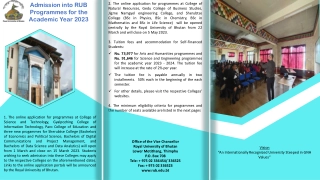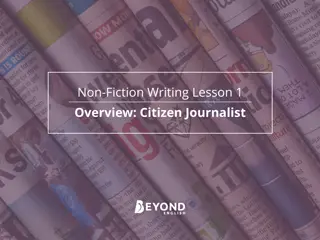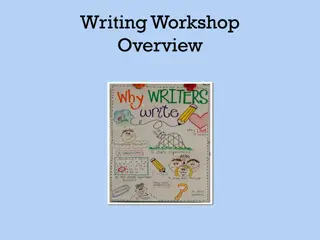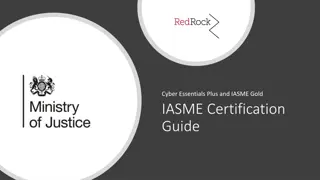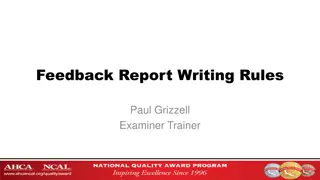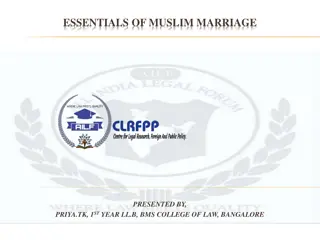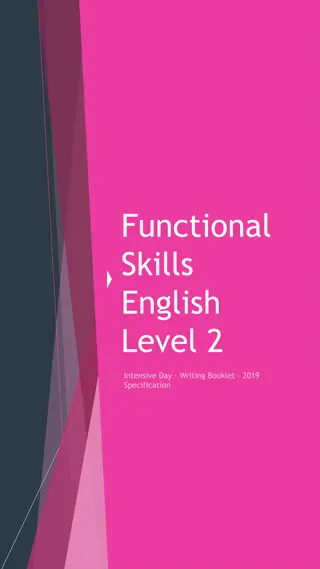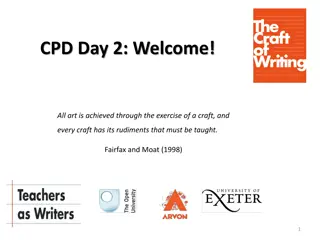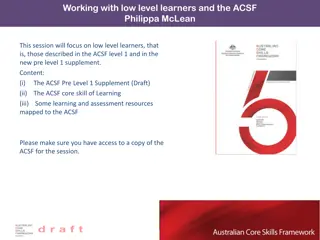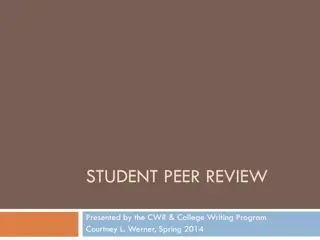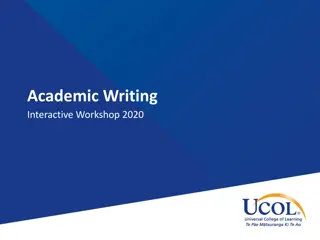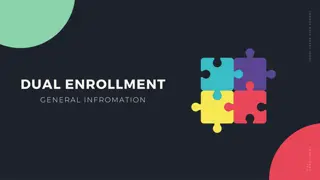College-Level Writing Essentials
Learn the essential components of college-level writing, including the structure of a college essay, the importance of a strong thesis statement, crafting effective body paragraphs, and concluding your essay meaningfully. Discover useful tips for getting started and improving your writing process.
Uploaded on Sep 11, 2024 | 0 Views
Download Presentation

Please find below an Image/Link to download the presentation.
The content on the website is provided AS IS for your information and personal use only. It may not be sold, licensed, or shared on other websites without obtaining consent from the author.If you encounter any issues during the download, it is possible that the publisher has removed the file from their server.
You are allowed to download the files provided on this website for personal or commercial use, subject to the condition that they are used lawfully. All files are the property of their respective owners.
The content on the website is provided AS IS for your information and personal use only. It may not be sold, licensed, or shared on other websites without obtaining consent from the author.
E N D
Presentation Transcript
The Dos and Donts of College-Level Writing Mini-Lesson #31
What about the 5-Paragraph Essay? The 5-paragraph model does not cut it for college-level writing. Very limiting Encourages bad habits
A College Essay Should Have An introduction that contains a thesis statement A body A conclusion
Introduction Should provide only essential background information Can be more than one paragraph Needs to contain a thesis statement/argument/ the point of your paper
Thesis Statements A thesis statement is the main argument of your paper. It should not be too broad or too narrow. A thesis statement is NOT simply a theme or trope (i.e., love, money, happiness). Stating that an author discusses love is not an adequate thesis; instead, a thesis should be something someone could argue.
Body Paragraphs The purpose of the body paragraphs, and really your entire paper, is to support the argument your thesis makes. Include critical sources and textual evidence (if applicable) to strengthen your argument. The progression of the paper and your argument should be logical and easy to follow.
Conclusion The conclusion should review or restate the main points of the essay; however, this should NOT be an exact repetition. A conclusion needs to answer the question So what?
Getting Started Brainstorm. Write down ideas you have, even if you don t think they will make it into your paper. Construct an outline. Talk to your professor. Come to the Writing Lab.
Outline Introduction: A. Opening remarks B. Thesis Statement Body Paragraph X: A. Topic Sentence 1. Subpoint a. Detail b. Detail. Conclusion: A. Review main points. B. So what?
Writing Tips Start early! Let your writing simmer for a while before publishing it, turning it in, or sending it. Write when you write; revise when you revise; never mix the two. Write deliberately and purposefully, not carelessly or haphazardly . Invest in a good grammar and style book.
More Tips Read your writing aloud. Avoid conversational English ( lo and behold, I can t stand people who, etc.) in your writing. Look up words and avoid using words with Usage Labels such as Informal ( kids for children ), Slang ( cool as in a real cool person ), Offensive Slang ( redneck ), Nonstandard ( irregardless ), Archaic ( thou ), and Colloquial ( pretty as in pretty good )
Even More Tips When your paper is finished, PROOFREAD! Double, triple, and quadruple check everything you write, even emails. Avoid making grammar choices based on guesses, instincts, and personal preferences follow standard practices.
Cont. Question your spelling ( hand-written or handwritten ), word choice ( the reason . . . is that or the reason . . . is because ), punctuation (commas inside or outside closing quotation marks?), and grammar ( If I was and If I were ), especially commonly confused words (its and it s) and commonly overused and misused punctuation (commas, semicolons, and apostrophes). Don t depend on your spell checker to find all of your spelling errors ( With friends like these, who needs enemas your spell checker will not locate this misspelling of enemies ).
Resources for Writers UWF Writing Lab: www.uwf.edu/WriteLab Purdue OWL: www.OWL.english.purdue.edu


